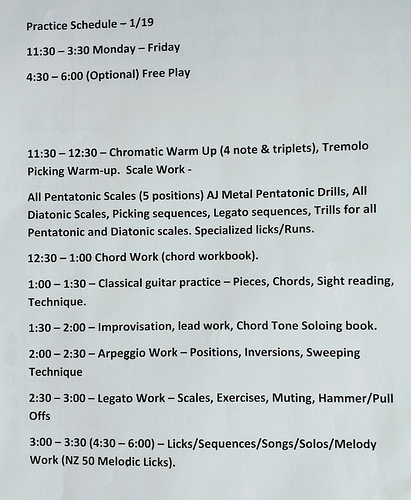Does it take more time DOCUMENTING than actually DOING??
ive been massively needing to gain focus and do some goal setting with my skills. So I am trying to focus on a few things (Claus Levin ideas) and do some metronome work so I can actually document and measure and have some clue of what I am actually doing
So I had a free day today. I decided to mainly focus on 1 string skills such as the Yngwie 6 note patterns etc.
Well I also wanted to document everything to track total time and bpms etc. I started at 10AM, worked a while. Took a break to eat, Played and documented some more. Went to the gym. ate again. Settled in to play more tonight etc.
long story short, after tallying the ACTUAL playing time, I ended up with 146 mins. ‘Only’ 146.
except for the 2hrs of so spent going to the gym, I feel I worked on guitar all day…yet I only have 146 mins actual playing time to show for it??
Its weird because I SEE (and seriously need) the benefits of documenting things so I KNOW what I am doing instead of guessing. But is it supposed to take that long to document stuff???
I feel like if I would have “just played” and someone asked me how much I played I would have said “4-5 hours.” I easily spent 60-90 mins figuring out how to document stuff
So there is a benefit since I pushed myself harder than normally to where I actually had to do stuff like play 3 minutes and rest 1 minute or whatever. if I were “just playing” id never push that hard.
and of course in a month ill have some clue what I was doing whereas if I were winging it id have no clue
The tradeoff being that I feel I lost precious time trying to figure out how to document stuff.
Whats the balance?? I realize that the documenting process will streamline. for instance tomorrow I wont need to write down as much detail and/or ill just copy/paste
So do any of you actually document things or keep any kind of playing diary??
Thanks, JJ

